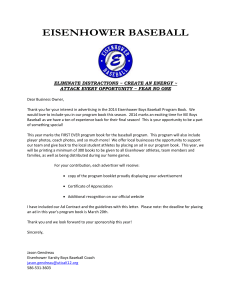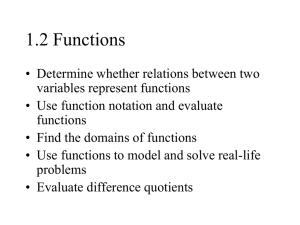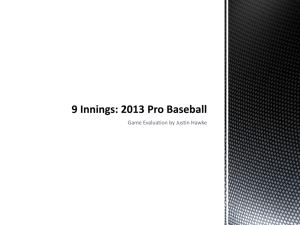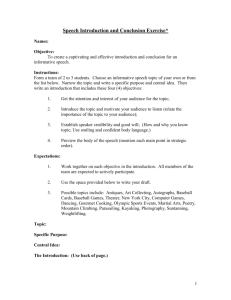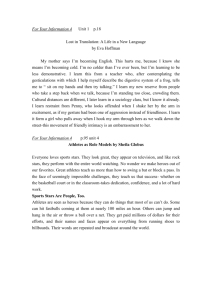No changes for drug testing methods or penalties in Major League
advertisement
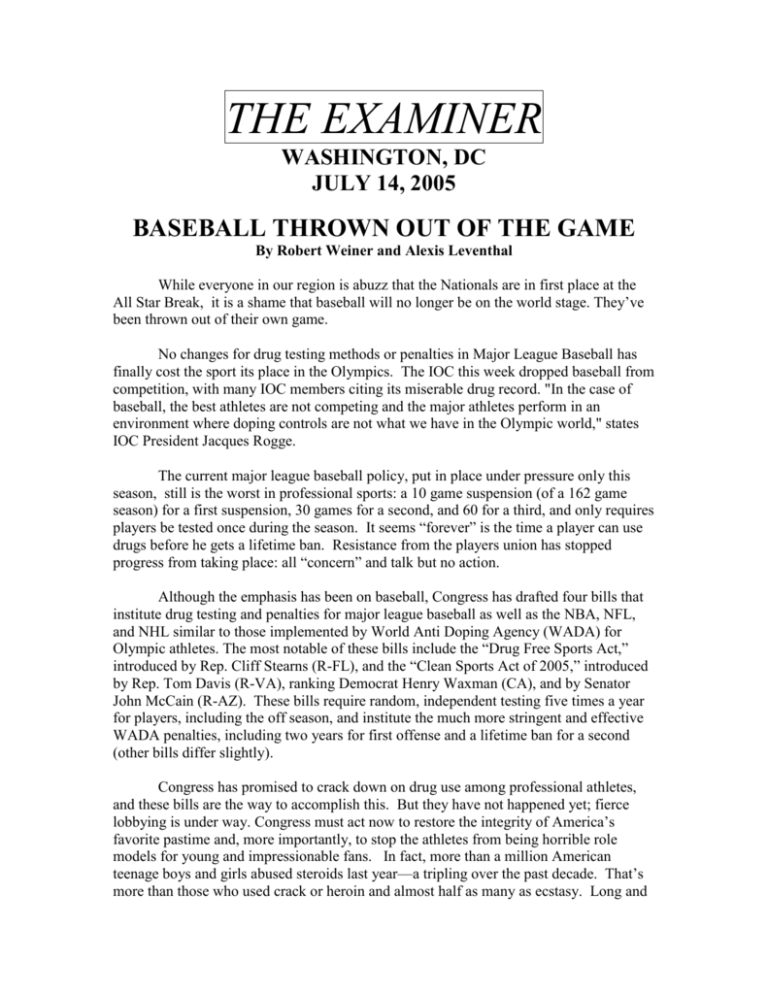
THE EXAMINER WASHINGTON, DC JULY 14, 2005 BASEBALL THROWN OUT OF THE GAME By Robert Weiner and Alexis Leventhal While everyone in our region is abuzz that the Nationals are in first place at the All Star Break, it is a shame that baseball will no longer be on the world stage. They’ve been thrown out of their own game. No changes for drug testing methods or penalties in Major League Baseball has finally cost the sport its place in the Olympics. The IOC this week dropped baseball from competition, with many IOC members citing its miserable drug record. "In the case of baseball, the best athletes are not competing and the major athletes perform in an environment where doping controls are not what we have in the Olympic world," states IOC President Jacques Rogge. The current major league baseball policy, put in place under pressure only this season, still is the worst in professional sports: a 10 game suspension (of a 162 game season) for a first suspension, 30 games for a second, and 60 for a third, and only requires players be tested once during the season. It seems “forever” is the time a player can use drugs before he gets a lifetime ban. Resistance from the players union has stopped progress from taking place: all “concern” and talk but no action. Although the emphasis has been on baseball, Congress has drafted four bills that institute drug testing and penalties for major league baseball as well as the NBA, NFL, and NHL similar to those implemented by World Anti Doping Agency (WADA) for Olympic athletes. The most notable of these bills include the “Drug Free Sports Act,” introduced by Rep. Cliff Stearns (R-FL), and the “Clean Sports Act of 2005,” introduced by Rep. Tom Davis (R-VA), ranking Democrat Henry Waxman (CA), and by Senator John McCain (R-AZ). These bills require random, independent testing five times a year for players, including the off season, and institute the much more stringent and effective WADA penalties, including two years for first offense and a lifetime ban for a second (other bills differ slightly). Congress has promised to crack down on drug use among professional athletes, and these bills are the way to accomplish this. But they have not happened yet; fierce lobbying is under way. Congress must act now to restore the integrity of America’s favorite pastime and, more importantly, to stop the athletes from being horrible role models for young and impressionable fans. In fact, more than a million American teenage boys and girls abused steroids last year—a tripling over the past decade. That’s more than those who used crack or heroin and almost half as many as ecstasy. Long and short term effects of steroid usage are hazardous and even lethal; ranging from mood swings and depression to cancer and diabetes. The dangers of these drugs are too great and the influence of professional baseball players too widespread for such athletes to continue to abuse drugs without severe punishments. World sports bodies and governments no longer tolerate athletes that use performance-enhancing drugs. So it is not surprising that the IOC would reject a sport that does just that. The solution to baseball’s drug problem is clear: require testing of U.S.-based athletes to be done by the United States Anti-Doping Agency (USADA) at home and by WADA when abroad, and implement the WADA/USADA penalties. The only question for changing the control of testing and punishments for professional sports is implementing this legislation under the current Drug Czar, John Walters. Walters has remained silent on this issue unlike his predecessor, General Barry McCaffrey, who was passionate and influential in the creation of WADA and USADA. McCaffrey has also called on baseball to add the other WADA-tested drugs -amphetamines, Human Growth Hormone and EPO. When it comes to drug-use in professional baseball, Congress, the owners, and the fans, but apparently not the representatives of the players, are in favor of meaningful action. Maybe now, after the Olympic announcement, Congress will deliver on its promise and players will no longer fight change for independent testing and effective penalties. Removing baseball’s anti-trust exemption is another “biggie” they’d pay attention to. It’s time to stop allowing drug-abusing athletes to dictate drug policy and start holding them accountable for their actions. We were privileged to be among the over 45,596 fans who saw the Nationals play on opening day this year and the millions who are avidly watching their progress. Yet we have a sinking feeling with each game, not knowing whether we are watching drugs or skills in the athletes’ performances. The same is true for fans of every baseball team in every park in America. If the players want to yell at us for the insinuation, then they will have no problem throwing out cheaters and joining in support of Congressional action. Robert Weiner was spokesman for the White House National Drug Policy Office 1995-2001. He directed the World Anti-Doping Agency media outreach at the Salt Lake City Olympics and White House Drug Policy media at the Sydney Olympics. Alexis Leventhal is a sports statistician for the Athletic Department at Haverford College, and policy analyst at Robert Weiner Associates.
